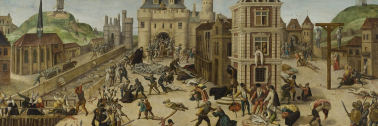c. 1510 – c. 1579
Biography
From Christopher M. Flood, “Of Pastorals and Partisans: Nationalist Variations on the Myth of Rural Virtue in Sixteenth-century, French, Anti-Protestant Polemics.” Sixteenth Century Journal (forthcoming 2020):
“Relatively little is known about Artus Désiré. What is known mostly comes from contemporaries who characterized him as a country priest, a cantankerous hack, and a meddler. He was probably all of that, but—and this is the point that is frequently forgotten—he was also one of the most influential voices of his time. In the span of about thirty years, this common priest published over one hundred editions of his twenty-five lengthy, anti-Protestant pamphlets (Giese 36–73). One could safely assume that such a rate of publication could only have been justified by significant public demand.
“A greater testament to his status during his life, however, is provided by a few examples of his interactions with the royal family of France. Following the failure of the 1561 Colloquy of Poissy to effect a reconciliation between increasingly divergent Catholic and Calvinist sects, Désiré set out on a now infamous, ill-fated attempt at treason. Though many of the details are unclear, he was arrested en route to Spain to elicit Spanish intervention on behalf of the ultra-Catholic faction against the increasingly tolerant Charles IX (1550-1574) and the queen mother, Catherine de’ Medici (1519-1589). Most remarkable about the story is the light punishment he received: five years of house arrest in a monastery, of which he only served about seven months. His sentence is particularly noteworthy, considering that Catherine seems to have personally intervened in the trial via her trusted advisor, the chancellor Michel de l’Hospital (1507-1573). Given Catherine’s legendary—albeit disputed—penchant for permanently eliminating anyone who interfered with her plans or threatened her hold on France, and the fact that Désiré’s execution would have served as a sensational example to other would-be traitors, this act of clemency is intriguing. Perhaps it accomplished something more valuable to her larger designs, such as winning the favor of a public who clamored for Désiré’s works; or it may have represented a mercy granted in recognition of literary service to his and Catherone’s common struggle against the growth of Protestantism. Whatever the reason, Désiré survived his folly and was permitted to take up his plume again. The royal family did, nonetheless, occasionally tire of Désiré’s constant rabble-rousing. In 1564 Charles IX banished him from the kingdom, only to welcome him back in 1568—not only into France, but into his own secret council (Giese 30). Though exceptional otherwise, such royal indulgences seem to have been the rule throughout Désiré’s life, something all the more impressive when his origins and abilities are taken into account.
“While many of his more prominent peers benefited from traditional advantages such as high birth or refined literary talent, Désiré overcame glaring lacks in both, relying instead on dogged tenacity and on an ability to communicate with the common man. Unflinching in his devotion and unrestrained in his simplistic, abusive style, he exhibited a knack for translating ecclesiastical anxieties into a form both intelligible to the uninitiated and resolutely incendiary. There were certainly better writers and theologians on both sides of the confessional conflict, but none could match Désiré in bald aggression or single-minded focus. From a reader’s standpoint, the latter is possibly the most tiresome quality of his work. Désiré shamelessly recycled topics and tropes, developing a style as monotonous as it was apoplectic. This tendency toward repetition is particularly evident given his unusual devotion to revision and re-edition. But it is just this persistence that makes his work an important object of study. Read individually his pamphlets are tedious. Read as a corpus against their context, they reveal the competent work of a crude but cunning social strategist who effectively played on the broad social anxieties affecting France.”
Works
- Les Combatz du fidelle papiste pelerin romain, contre l’apostat priapiste, tirant à la synagogue de Geneve, maison babilonique des Lutheriens. Ensemble la Description de la cité de Dieu, assiégée des Heretiques. (1550)
- Loyauté conscientieuse de taverniers. (1550)
- Le Deffensoire de la foi chrestienne, contenant en soy le Miroer des errantz. autrement dit Lutheriens, nouuelleme augmenté, & corrigé, oultre les precedantes impressions. (1552)
- Combats du fidele chrestien, dit papiste, contre l’infidele apostat antipapiste. (1555)
- Le grand et admirable signe de Dieu apparu au ciel. (1563)
- Les grans abus et barbouilleries des taverniers et tavernieres, qui meslent et brouillent le vin. Avec la feinte reception et ruse des Hostesseset chambrieres envers leurs Hostes. Plus une reformation des Taverniers et gourmandise. (1578)
- Batailles et victoires du Chevalier Celeste, contre le Chevalier Terrestre: l’un tirant à la maison de Dieu, & l’autre à la maison du prince du monde, chef de l’Eglise maligne. (1585)
